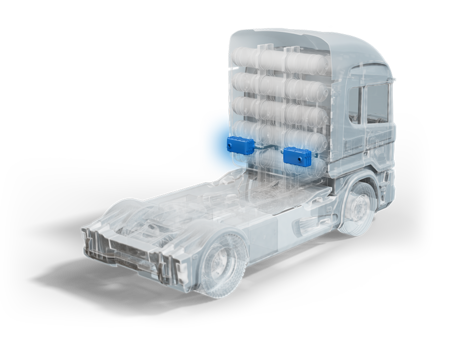
A truckload of
sustainability
How fuel cells in trucks can revolutionize freight transportation
The real future of private vehicles lies in battery-powered electric drives. Although it is likely that trucks will be emission-free in future, it is fuel cells that offer the most promising technology. And it is micronAir solutions for intake air filtration and the humidification of fuel cells that contribute to increased performance while maintaining maximum safety.
Regular drivers will notice quite a few trucks on the highways. In Europe, for example, there are over six million trucks on roads. Trucks transport goods – some of which are perishable – and often have to cover long distances under time pressure. Therefore, freight companies break out in a sweat just thinking about the future of zero-emission trucking. It is inconceivable for them to wait perhaps hours for the battery to recharge.
The capacities and energy densities of modern lithium-ion batteries are simply not designed for heavy, energy-intensive vehicles like trucks. And this type of battery wouldn’t be very practical either: it would last for just a few hours of driving and its weight would restrict the amount of the goods the truck could carry. However, it is also clear that if we are serious about our efforts to reduce emissions, the future of trucking cannot lie in diesel engines. E-fuels are too inefficient to offer a feasible alternative, so how is it possible for the mobility revolution to succeed in the logistics sector?
Hydrogen – The new diesel
Although hydrogen technology will almost certainly remain a niche product for private vehicles, it is regarded as an alternative to diesel in the freight industry. It is a serious option, as fuel cell technology offers significant advantages for trucks.
“Hydrogen is an emission-free technology if it is produced using green electricity,” says Felix Herberg, Vice President Global Market Segment Commercial Vehicles at Freudenberg Filtration Technologies. “Water vapor is the only thing produced during the journey.” He explains that trucks can travel more than 1,000 kilometers (621 miles) on a single tank of hydrogen fuel. “And refueling takes just a few minutes,” he emphasizes, “so logistical planning wouldn’t change much”.
Protecting components with clean air
The fuel cells require oxygen from the air to produce electricity. However, since the sensitive components have a strong reaction to salts, nitrogen oxides, and other substances, it is essential for the service life and safety of the cells to effectively filter the supply air. Contamination can permanently reduce performance, which in turn affects the operating costs and profitability of the drive.
micronAir fuel cell filters prevent this from happening: they have been specially developed for fuel cells to provide the membranes and catalyst material with reliable protection from contaminant gases and particles.
“The fuel cells contain sensitive components, which need to be protected to ensure the cell maintains its performance over time,”
says Herberg.
“Integrating a reliable air filter is a straightforward way to achieve this.”

Preventing power loss
One step closer to the
green future
Current climate developments – for example increasingly frequent extreme flooding and droughts – are a sign that the shift toward zero-emission transportation is inevitable. This is why, in close and long-term collaboration with the mobility industry, we provide superior technological and innovative air quality solutions worldwide, contributing to sustainability and environmental protection.
 automotive filtration insight
automotive filtration insight